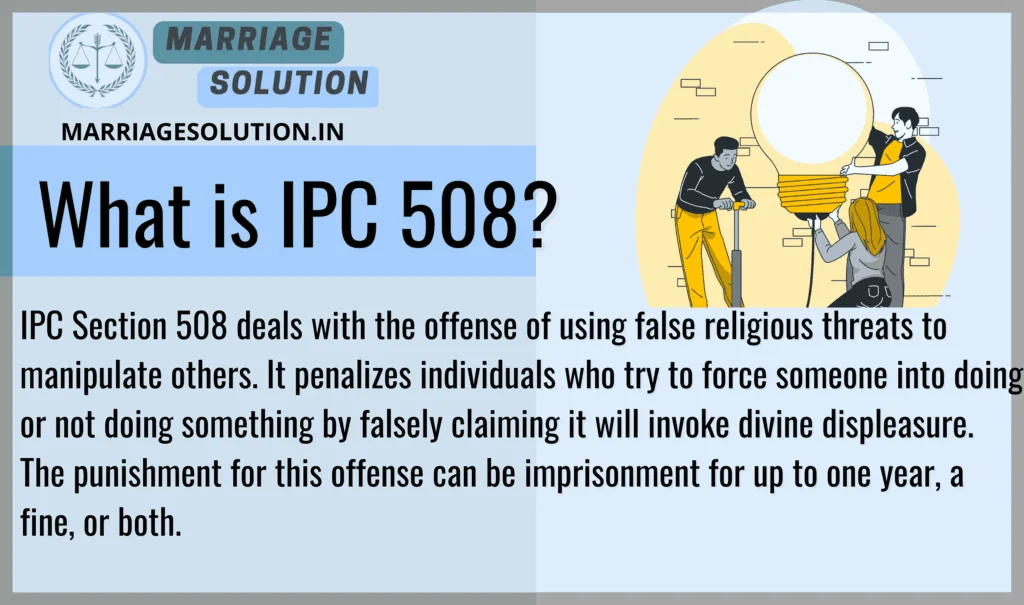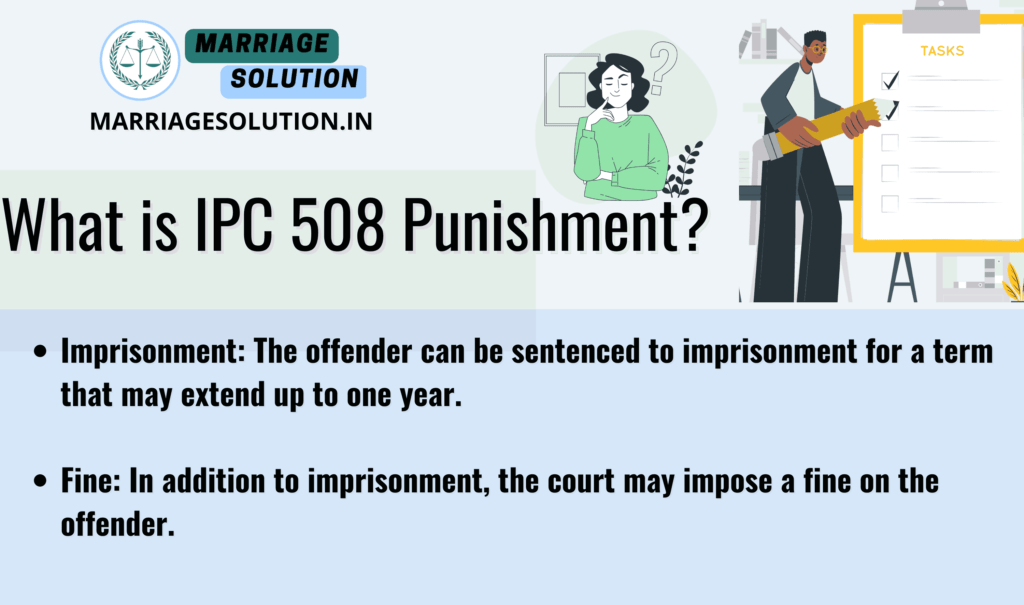Introduction of IPC Section 508
IPC Section 508 is part of the Indian Penal Code, which outlines various criminal offenses in India. This section specifically addresses acts where a person is induced to believe that they will incur divine displeasure if they do not comply with certain actions. It prohibits manipulating individuals through false religious threats. The section aims to deter coercion based on unfounded beliefs about divine consequences. Offenders under IPC 508 may face imprisonment for up to one year, a fine, or both, as prescribed by law.
What is IPC Section 508 ?
IPC Section 508 deals with the offense of using false religious threats to manipulate others. It penalizes individuals who try to force someone into doing or not doing something by falsely claiming it will invoke divine displeasure. The punishment for this offense can be imprisonment for up to one year, a fine, or both.

IPC Section 508 Overview
IPC Section 508 addresses the offense of coercing someone to act or refrain from acting by falsely invoking divine displeasure. This law prohibits inducing fear of divine consequences to manipulate individuals into actions they are not legally required to perform or actions they are entitled to perform. The punishment for this offense can include imprisonment for up to one year, a fine, or both.
Key Points
- Religious Intimidation (Divine Displeasure):
- This refers to making someone believe that if they don’t do something they are not legally obligated to do, or if they do something they have a legal right to do, they will face divine displeasure (punishment or disapproval from a higher power).
- Voluntarily Causing (Intentional Act):
- The accused must intentionally and willingly create this belief in the person’s mind. It cannot be accidental or unintentional.
- Illegal Acts (Unlawful Compulsion):
- It involves forcing or compelling someone to perform an act that they are not legally required to do, or to refrain from an act that they have a legal right to do.
- Object of Interest (Personal or Others):
- The fear of divine displeasure can be induced either for the person themselves or for someone else in whom they have an interest or care about.
- Wide Scope (All Religions):
- This provision applies to any religion or belief system. It is not specific to one religion or deity, making it broadly applicable.
- Punishment Severity (Moderate Offense):
- The punishment for this offense is considered moderate, with imprisonment for up to one year, a fine, or both. It is not categorized as a severe offense compared to other sections of the Indian Penal Code.
IPC 508 Punishment
- Imprisonment: The offender can be sentenced to imprisonment for a term that may extend up to one year.
- Fine: In addition to imprisonment, the court may impose a fine on the offender.

508 IPC bailable or not ?
IPC Section 508 is a bailable offense. This means that if a person is accused under this section, they have the right to apply for bail and can be released from custody as per the discretion of the court, subject to certain conditions or sureties as deemed appropriate by the court.
Section 508 IPC in short information
| Aspect | Description |
|---|---|
| Definition | IPC Section 508 deals with the offense of inducing a person to believe that they will face divine displeasure if they don’t comply. |
| Offense | It involves causing or attempting to cause someone to act against their will by instilling fear of divine punishment. |
| Punishment | The punishment can include imprisonment for up to one year, a fine, or both, as decided by the court. |
| Bailable | Yes, the offense under IPC 508 is bailable, which means the accused can seek bail from the court. |
508 IPC FAQs
What is the essence of the offense under IPC 508?
The essence of the offense under IPC 508 is inducing a person to believe that they or someone they are interested in will face divine displeasure if they do not comply with the accused person’s demands.
Is IPC 508 limited to any specific religion?
No, IPC 508 is not limited to any specific religion. The divine displeasure can be related to any religion or belief system.
Can IPC 508 apply if the person is legally bound to do the act?
No, IPC 508 cannot apply if the person is already legally bound to do the act in question. It is applicable only when the person is not legally bound to do or omit the act.
Is IPC 508 a bailable offense?
Yes, the offense under IPC 508 is a bailable offense.
What is the maximum punishment for an offense under IPC 508?
The maximum punishment for an offense under IPC 508 is imprisonment of up to one year, or with fine, or with both.
If you need support with court proceedings or any other legal matters, don’t hesitate to reach out for assistance.
Court or any other marriage-related issues, our https://marriagesolution.in/lawyer-help-1/ website may prove helpful. By completing our enquiry form and submitting it online, we can provide customized guidance to navigate through the process effectively. Don’t hesitate to contact us for personalized solutions; we are here to assist you whenever necessary!
